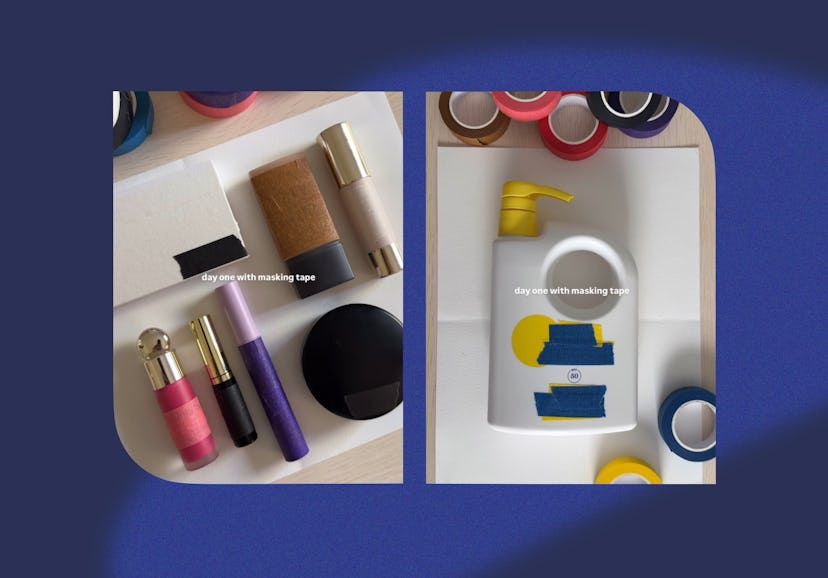Money
Guilty Of Overspending? Try Removing “Visual Noise”
Your product labels might be blowing your budget.
Look around your room right now. How many labels do you see? Maybe your makeup collection is splashed with brand names, your perfumes are decorated with designer logos, or your hair products are covered with buzzwords. This is called “visual noise.”
On Instagram, @chessiedomrongchai tried to quiet that noise by using masking tape to cover all the labels of her favorite beauty products. Now, instead of reading brand names every time she gets ready, she only sees blank bottles, plain tubes, and unlabeled tools.
When someone in the comments asked why she did it, she replied, “To decenter myself from brands and remove branding in my home. It helps me see my items for what they do, not what they are,” and the benefits quickly became clear. “I could see this as a helpful way to move away from overconsumption,” another person wrote. “Just seeing what we have at face value versus chasing what’s trending/aesthetic enough. Good for the brain and the earth.”
Another wrote, “I can’t explain it, but you made it all 10x less overstimulating.” Chessie replied to say that our brains are “constantly reading labels and identifying brands,” even without realizing it. Take away visual noise, and everything’s instantly a lot more “quiet.”
Not only does this strategy sound like an easy way to remove stress from your life, but covering up your product labels might even reduce your urge to shop. Here, an expert weighs in.
What Is Visual Noise?
According to therapist Lisa Chen, LMFT, visual noise is the never-ending, constant stream of labels, logos, and branded cues in your environment. Think about the bright shampoo bottle in your shower with the recognizable logo, the makeup products scattered across your vanity in all different shapes and sizes, and the cleaning products you have that tout “50% more!” on the label.
“Sometimes, our bathrooms can end up looking like a mini drugstore aisle,” she tells Bustle. “All of this clutter starts to add up over time, and it can give us a low-grade sense of ‘too much.’” The same is true for other rooms, too. There’s visual noise in your kitchen on cereal boxes, on the office supplies on your desk — where there’s a label, it exists.
Why Get Rid Of It?
While not everyone will notice or care, visual noise can take a toll on your nervous system. “When there’s a lot to process visually, our brains work harder to screen and filter what’s relevant and not,” Chen says. “That can create a subtle chronic form of pressure and stress. For my highly sensitive clients, this is too much sensory overstimulation.”
By getting rid of visual noise, you essentially give your brain a break. “It also reduces decision fatigue,” she says. “Visual noise is not just clutter you can trip over, but the clutter your brain has to process. When we reduce what’s screaming for our attention, we feel more grounded and less scattered.” It might even help you focus.
Covering labels can help reduce feelings of anxiety or stress, and it can even help if you’re trying to spend less money. By removing the products’ branding, @chessiedomrongchai was able to enjoy the products she already had, and Chen says there’s really something to it.
“A logo isn’t neutral — it’s a marketing cue meant to trigger ‘buy again’ or ‘upgrade,’” she says. “Tantalizing labels unconsciously spark desire [and comparison], especially when shopping. When you block those cues, you’re more likely to finish what you have, instead of buying more.”
Getting Rid Of Visual Noise
Trying this hack out for yourself is as easy as peeling off labels or covering them up. You can also decant products into refillable containers or plain glass bottles, and remove things from your countertops.
If you often feel the urge to shop for the next best thing, cover the brand names on your must-have products. As soon as you take control of the visual noise, you should feel a sense of calm. Suddenly, you can take a deep breath, relax, and focus on what really matters. As Chen says, “When your environment isn’t shouting at you, it’s easier to hear yourself think.”
Source:
Lisa Chen, LMFT, licensed psychotherapist, founder of Lisa Chen & Associates Therapy
